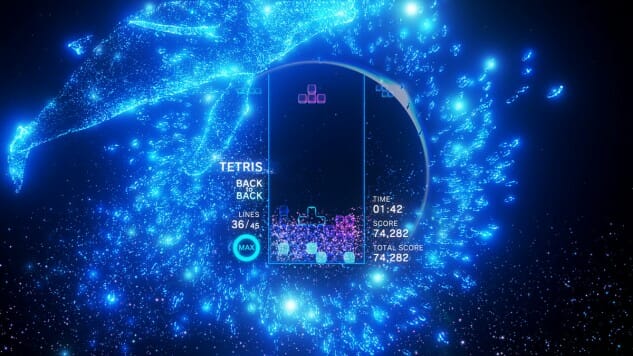People think it’s funny to not use something’s real name on Twitter. The Shape of Water becomes “The Fish Fucking Movie.” Red Dead Redemption 2 becomes “The Cowboy Game.” And Tetris Effect becomes “Drug Tetris,” or, as I tended to call it, “Psychedelic Tetris.”
The goal here isn’t to diminish the game, even if people are clearly making a joke about it. It’s to refer to it in the most direct and concise fashion, boiling Tetris Effect down to its essence to make sure people immediately know what sets it apart from standard Tetris. Instead of the barebone backgrounds and Russian folk music of old, this Tetris unites colorful visuals and a pulsing electronic score with the game’s classic puzzle action to help the player feel synesthesia. The music and images react to the motion of the blocks, which change speed based on the tempo of the music, and it’s all supposed to become one single overarching sensory experience. And that’s why both “Drug Tetris” and “Psychedelic Tetris” seem like names that should fit.
They really don’t, though. The name we should have settled on is “New Age Tetris.” After playing through the entire game, I can verify that its psychedelic bona fides have been greatly exaggerated. Its “trippy” visuals are too programmatic and predictable to ever attain the dreamlike atmosphere of a truly psychedelic experience. It too often relies on stock trappings from the New Age movement, with imagery from Native American culture and Eastern spiritualism. On more than a few levels the synesthetic effect is undermined by those uninspired visuals—sometimes I felt like I was stuck in an ‘80s sitcom mockery of a New Age book store. One level of Tetris Effect comes perilously close to whipping out some dancing Kokopellis.
The music also doesn’t quite fit the psychedelic tag. It’s a bunch of original electronic pop songs, largely wordless but with vocals on a few levels. The interaction between the music and the player’s action is immaculate—as you spin and drop your L blocks you’ll hear corresponding notes and melodies seamlessly merge with the base track—and I still have some of the songs stuck in my head, days later. The problem is that none of the music is euphoric or powerful enough to push the player into the kind of delirium that they can find on the dance floor, at a concert or even in other synesthetic games.

Part of that might be because Tetris is a game that inherently locks into your synapses and makes the surrounding world melt away. Anybody who played it so long on the Game Boy that they saw blocks falling at them in their sleep can attest to that. That’s actually what Tetris Effect is named after. I don’t need reactive music or images to feel at one with this game. Even with virtual reality goggles and headphones on, the single-minded focus I felt playing Tetris Effect forced the music and visuals into the background. I could see and hear them, and tell they were changing alongside my performance, but they didn’t always make a strong enough impression in the face of my endless struggle with plummeting blocks.
The music also doesn’t have enough stylistic variety. If Tetris Effect was truly going for a psychedelic atmosphere, there’s a wide swath of psychedelic music that could’ve helped but that isn’t even touched on. The music here is always defined by a prominent dance beat, which keeps everything too tethered and rigid to have the sense of surprise and displacement found in a lot of psychedelic music. It’s hard to get lost and confused when there’s a steady beat to grab hold of.
When I saw people calling Tetris Effect by nicknames that highlighted its supposedly druggy, psychedelic nature, I got a specific vision in my head. It was part Lumines (which is still the closest comparison), part Thumper, and part Dyad, the fantastic Tempest-style shooter from 2012 that builds to a genuinely unhinged and psychedelic climax. There’s almost none of those last two games here, though; Tetris Effect is essentially Lumines recreated as VR Tetris. And despite how down I might sound on it, that means it’s still one of the most fascinating things I’ve played this year.
I know this sounds like I probably hate this game. I absolutely don’t, though. It might not be what I had hoped for, but Tetris Effect is still a brilliant and forward-thinking new take on an old and deeply familiar classic. It’s a curious combination of relaxation and extreme stress, often swerving abruptly from one right into the other, and surrounding myself in it through virtual reality and headphones makes it even more powerful and evocative. It could use some more variety in its music, and be a bit more esoteric and surreal with its imagery, but it’s still a gorgeous, sometimes glorious vision, and a true VR stand-out. It’s just not the mind-altering psychedelic experience I was expecting.
Garrett Martin edits Paste’s comedy and games sections. He’s on Twitter @grmartin.

